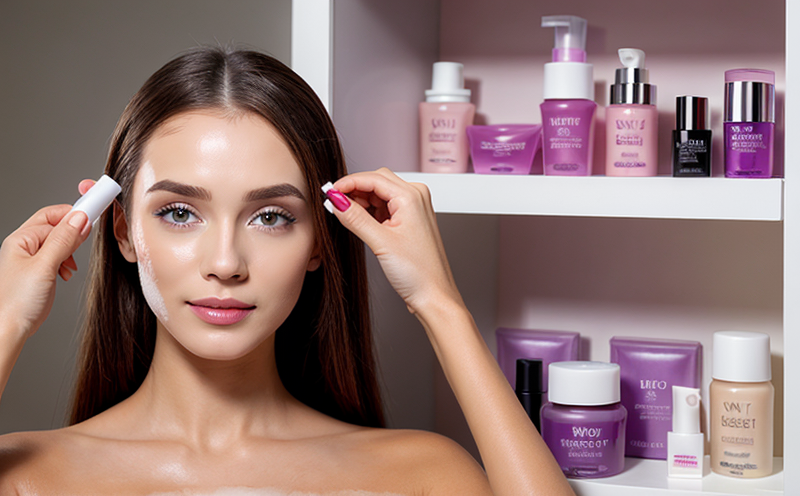Brightening Efficacy Testing in Whitening Creams
The demand for skin-lightening products has been on a steady rise globally, driven by consumer preferences towards healthier and more radiant complexions. In the context of cosmetic testing, brightening efficacy testing is crucial to ensure that whitening creams meet regulatory standards and provide effective results as claimed.
Brightening efficacy testing typically involves evaluating the ability of a cream to reduce skin pigmentation or lighten areas affected by hyperpigmentation such as freckles, age spots, and sunspots. This service is essential for ensuring product safety and effectiveness, particularly in markets with stringent regulations like Japan, South Korea, Europe, and North America.
The testing process involves several key steps. First, the skin of test subjects is prepared by removing any surface impurities or dirt that could interfere with the accuracy of the results. Specimen preparation may include applying a known concentration of melanin to the skin to simulate hyperpigmentation conditions. The cream under evaluation is then applied according to predefined protocols.
Post-application, the test subject's skin is monitored over a specified period using various instruments and techniques. These can include spectrophotometric measurements to quantify changes in skin tone, which are compared against control samples that do not receive the cream treatment. In some cases, biopsies may be taken at intervals post-treatment to observe changes at a cellular level.
The data collected from these tests is analyzed to determine if there has been a statistically significant improvement in skin brightness. Compliance with international standards such as ISO 21716:2018 and ASTM D7596-14 ensures that the testing methods are robust and reliable. Additionally, this service can help brands navigate market regulations, ensuring their products meet stringent safety requirements.
For quality managers and compliance officers, having access to accurate brightening efficacy data is crucial for maintaining brand reputation and consumer trust. For R&D engineers, it provides insights into the effectiveness of new formulations or ingredients. Procurement teams benefit from this service as they can verify that suppliers are delivering products that meet the desired standards.
The process also involves regulatory compliance with local laws like the FDA’s Final Rule on Sunscreen Labeling and European Union regulations for cosmetics. These requirements ensure that consumers receive safe, effective, and ethically produced products. Compliance officers will find this service particularly valuable in navigating these complex regulatory landscapes.
Customer Impact and Satisfaction
The success of a cosmetic product is significantly influenced by its ability to deliver on its promises, especially when it comes to skin lightening. By ensuring that brightening creams meet industry standards through rigorous testing, manufacturers can enhance customer satisfaction and trust.
Clients who invest in our brightening efficacy testing service gain more than just compliance with legal requirements; they also receive valuable insights into the performance of their products. This information allows them to make informed decisions about product formulations, packaging, and marketing strategies. Satisfied customers are likely to recommend these products, leading to increased brand loyalty and market share.
Moreover, meeting international standards can open up new markets for cosmetic brands. Products that comply with stringent regulations in one country often find it easier to gain acceptance in other regions. This global expansion can significantly boost a company’s revenue and reputation.
Customer satisfaction is not just about the product itself but also about the experience of purchasing and using it. By providing transparent, reliable test results, our service helps build trust with consumers who are increasingly concerned about the safety and efficacy of the products they use.
International Acceptance and Recognition
- Japan: Japan has some of the most stringent standards for cosmetic products, particularly when it comes to safety. Compliance with these regulations is crucial for international brands aiming to enter this market.
- South Korea: South Korean consumers are highly educated about product ingredients and efficacy claims. Brands that meet local standards are more likely to gain acceptance among these discerning customers.
- European Union (EU): The EU’s Cosmetics Regulation is one of the toughest in the world, requiring rigorous testing for all cosmetic products sold within its borders.
- United States: The FDA has specific labeling and safety guidelines that must be adhered to when marketing skin-lightening creams. Meeting these requirements ensures compliance with U.S. laws.
Our laboratory uses internationally recognized standards such as ISO 21716:2018, ASTM D7596-14, and others to ensure that our testing is accurate and reliable. By adhering to these standards, we provide clients with the confidence they need to meet global regulatory requirements.
Competitive Advantage and Market Impact
In an increasingly competitive market, having accurate data on product efficacy can be a key differentiator. Brands that can demonstrate the effectiveness of their whitening creams through rigorous testing are more likely to attract customers who value authenticity and transparency.
By offering this service, our laboratory helps brands stay ahead of the curve by ensuring they meet or exceed current industry standards. This not only enhances brand reputation but also positions them as leaders in innovation and quality. In a market where consumer trust is paramount, our testing can be a powerful tool for maintaining and growing market share.
The results from brightening efficacy tests are crucial for product development teams to refine their formulations further. By identifying which ingredients or processes yield the most effective results, companies can enhance their product offerings continuously. This continuous improvement cycle ensures that brands remain competitive in an ever-evolving market environment.





